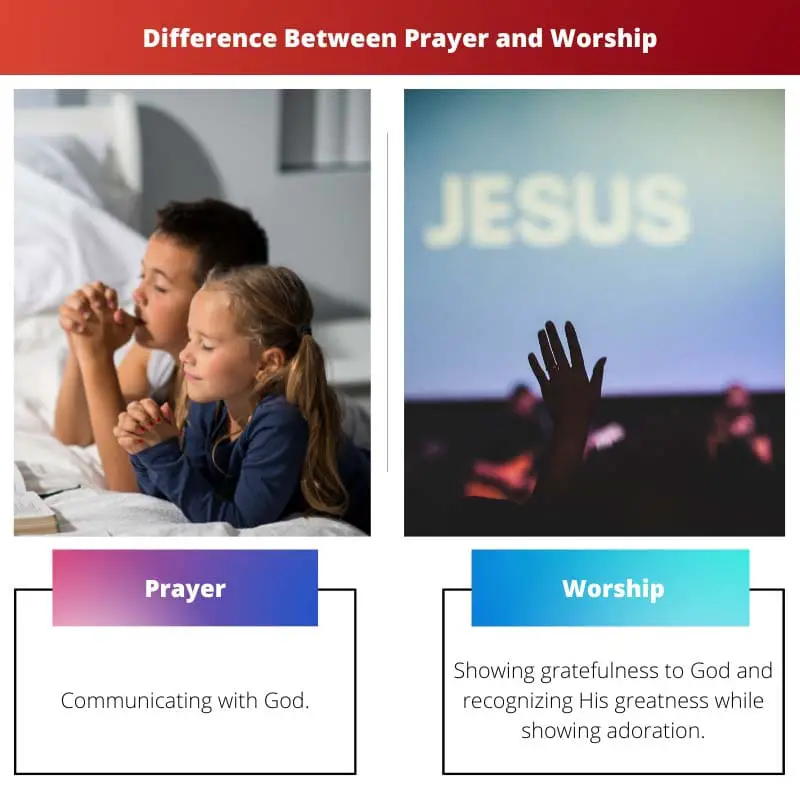Prayer and worship, both of these conceptions appear to be similar, however, when we look at their meanings, they are extremely different. One can move from prayer to worship, according to Jesus.
It’s worth noting that prayer and worship may coexist. Regardless of differences, prayer and worship may be done together to offer peace and nourishment to one’s spiritual life.
Key Takeaways
- A prayer is a form of communication with a higher power or deity, focusing on personal requests or intercession, while worship expresses reverence and adoration.
- Worship encompasses a broader range of activities, such as singing, dancing, and rituals, whereas prayer is a verbal or silent dialogue.
- Prayer can be done individually or in a group, while worship involves communal participation and can be performed in religious institutions or informal settings.
Prayer vs Worship
Prayer is a form of communication with a higher power or divine being. It involves expressing gratitude, making requests, etc. Worship is a broader term that encompasses prayer but also involves reverence and honor towards a deity or spiritual being, expressed through rituals and ceremonies.

Prayer is a type of devotion in which individuals petition the Creator for favors, make requests to Him, converse with Him, or thank Him for his activities.
It is the interaction between a human and God. Prayer is founded on spirituality, and when conducted regularly, it leads to spiritual improvement.
Worship is a manifestation of devotion and worship for God, which can be expressed through singing hymns, praying, or performing in God’s presence.
Worship is defined as actions of religious praise and devotion, as well as the honoring of God, as a mode of representation or an act of prayer in praise to God. It is a declaration of devotion to God.
Comparison Table
| Parameters of Comparison | Prayer | Worship |
|---|---|---|
| Definition | Communicating with God | Showing gratefulness to God and recognizing His greatness while showing adoration |
| Purpose | To talk to God, make requests, ask for favors, and thank him. | Showing gratitude and love. |
| Selfishness | Can be considered selfish since it embodies man’s interest. | Lacks selfishness |
| Goal | Spiritual progress | Reaching ritual accomplishment |
| Chanting | Yes | No |
| Guidance of priest | No | Yes |
| Repetition | Gets more power by repetition | Power doesn’t increase |
| Basis | Spirituality | Ritualism |
| Procedure | Doesn’t require a procedure | Requires a certain procedure |
What is prayer?
Prayer is a kind of communication. Confession can be expressed via prayer. It does not need any special technique because it is simply communication with God. A creature’s interest is embodied in prayer.
According to St. Augustine, “real prayer is nothing but love.” Similarly, St. John Damascene characterized classical prayer as “raising one’s mind and heart to God or begging good things from Him.”
In such instances, it is selfish, as opposed to adoration. Prayer is a completely spontaneous manifestation of a person’s mindset toward the spirit of God.
Prayer leads to spiritual enlightenment. Prayers help us achieve our objectives. It is held that repeats of prayers increase their potency.
Prayer is the lifeblood of the spirit. It is done or performed regularly, and it includes chanting and singing. A priest’s direction is not required for prayer. It can be spoken separately.
Our prayers might convey to Him that we love Him and appreciate everything He has done for us. Prayer is also a means to ask God questions or make requests of Him.
This involves praying to God for good health for family members or friends, strength and resilience in times of hardship, and consolation whenever we need it.
Prayer is more than merely asking God for things. It functions as a means of communication between you and God, allowing your connection with Him to deepen.
Just as no friendship can thrive in the absence of fellowship, the same is true of our relationship with the Lord. We can’t grow closer to Him until we pray.
It is the act of interacting with God, it is spending time alone with God and telling Him about yourself.
Prayer is a connection with the entire (God, nature, or reality as you perceive it) in which you become linked to the whole.

What is worship?
Worship is defined as religious adoration and devotion. It acknowledges and expresses God’s majesty. People express their thanks for the outcome of their dialogue with God.
Worship is founded on ritualism and leads to ritual fulfillment. People frequently demonstrate their devotion and adoration for him in many ways, such as worshiping him, sacrificing for him, and assisting others in the name of God.
Worship is defined as religious adoration and devotion. It leads to the reverence of God. Worship, in other terms, is an expression of love for God and consists only in praising God.
Worship, unlike prayers, does not imply confession and is not a dialogue with God. It is a way of life that must be practiced in a certain way.
Worshipping is not selfish. We are merely expressing our thanks to God when we worship.
Ritualism underpins worship. Worship leads to ritual advancement. Worship results in a ceremonial achievement.
It does not gain strength just by being repeated, which is a crucial point to remember. Worship is a method of distancing oneself from daily life.
It’s a method to break up with the monotony of everyday living. It is a changing experience that brings the finite closer to the limitless.
Worship is also not practiced regularly. In the case of a few religions, such as Hinduism, it is done at religious festivals. Chanting is not part of worship. It entails both action and appearance.
Singing, on the other hand, can be part of worship, but worship as a whole does not consist of the act of singing. Worship occasionally needs the assistance of a priest.
Worship, in its most basic form, is praising God and acknowledging everything He has done. We praise God because He is worthy of it.
God is shown to be a tremendously powerful and loving God when we consider everything He has done through creation and salvation, and we may express our love and respect to Him through worship.
He is the source of our being, our ability to think, and even our ability to worship in the first place.

Main Differences Between Prayer and Worship
- Prayer is a kind of connection with God. It means “reaching to God” or “feeling Grateful.” Worship, on the other hand, refers to religious adoration and devotion. It leads to the reverence of God. Worship is an outpouring of love for God.
- Prayer represents a creature’s interest. So, in that scenario, it is self-centered. Meanwhile, Worship is not selfish since it expresses our appreciation to God.
- Prayer is spiritual; it leads to spiritual advancement. Worship, on the other hand, is founded on ritualism and leads to ritual progression.
- Prayer involves chanting. Whereas worship does not include chanting. It entails both action and performance.
- Prayer does not require the assistance of a clergyman. It can be spoken on one’s own, but worship occasionally needs the assistance of a priest.
- It is commonly held that repeats of prayers increase their strength, while repetitions of worship do not increase their force.
- One of the fundamental distinctions between prayer and worship is that prayer does not need any specific process. Worship, on the other hand, necessitates a certain approach.
- It is commonly held that the recurrence of prayers increases their strength, while the repetition of worship does not increase their force.

- https://books.google.com/books?hl=en&lr=&id=XV3MSDLAt6kC&oi=fnd&pg=PR7&dq=prayer+and+worship&ots=-DwOEgdaWz&sig=q0NK3cVlBup9NN5FGKKG-WA6sNI
- https://ixtheo.de/Record/1483945111
